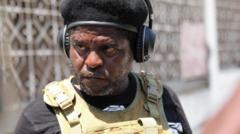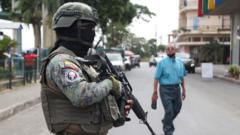A surge in gang violence and crime in Cape Town’s townships is prompting families to enroll their children in former white-only schools, despite the challenges of long commutes. Parents express deep concerns over safety, with some children facing threats and harassment at local schools. This shift underscores the significant educational disparities that persist more than three decades after apartheid.
Parents Turn to Former White-Only Schools Amid Safety Concerns in Cape Town

Parents Turn to Former White-Only Schools Amid Safety Concerns in Cape Town
Rising crime rates in South African townships are pushing parents to transfer their children to schools in safer areas, highlighting the inequalities stemming from the apartheid era.
Fears of escalating crime and gang violence in Cape Town’s townships are leading parents to take drastic measures, including transferring their children to former white-only schools. This trend highlights ongoing inequalities stemming from South Africa's apartheid history.
Sibahle Mbasana, a parent from Khayelitsha, Cape Town’s largest township, shared her traumatic experiences at a local school where her children faced threats from armed intruders, jeopardizing their safety and learning environment. "Thugs would go into the school carrying guns, threatening teachers," she recounted, emphasizing the lack of security to protect students from violence.
Despite the end of apartheid over three decades ago, many black students still confront significant disparities in education quality and safety. Mrs. Mbasana transferred her sons to a school located about 40 kilometers away in Simon's Town, where favorable conditions, such as more resources and smaller class sizes, allow for a better learning experience. Nevertheless, the long daily commutes pose their own risks and stresses for her children, who now wake up in the early hours to reach school.
Conditions at township schools are dire in some instances, with teachers facing extortion from local gangs and compromised safety. Reports indicate that at Zanemfundo Primary School, teachers have been threatened with violence and have even been asked to share a portion of their salaries as protection fees. As a response, the Western Cape Education Department has started placing private security at various schools.
Amid the challenges, many parents express a desire to escape the township conditions entirely, citing safety as a primary motive. Families are rapidly coming to the realization that they need to invest in their children's future by seeking safer educational environments, even if it means enduring lengthy commutes.
The struggle is indicative of a broader issue of educational inequality across South Africa. According to reports, the disparities experienced by children in underprivileged areas are exacerbated by inadequate funding, high student-teacher ratios, and institutional neglect.
Experts warn that without a significant shift in government policy and educational funding, underprivileged schools will continue to struggle, keeping thousands of children at a disadvantage. The Mbasana family's experience, along with countless others, reflects the urgent need for improvement in education equity in South Africa, where the legacy of apartheid continues to impact generations.


















